US works on ‘comprehensive response’ on Iran

Greg Hatcher, CEO of White Knight Labs, offers cybersecurity perspective on Israel / Iran conflict
Former Green Beret: “We Are in the Year 2024, and We Are in Full-Blown Cyber Warfare”
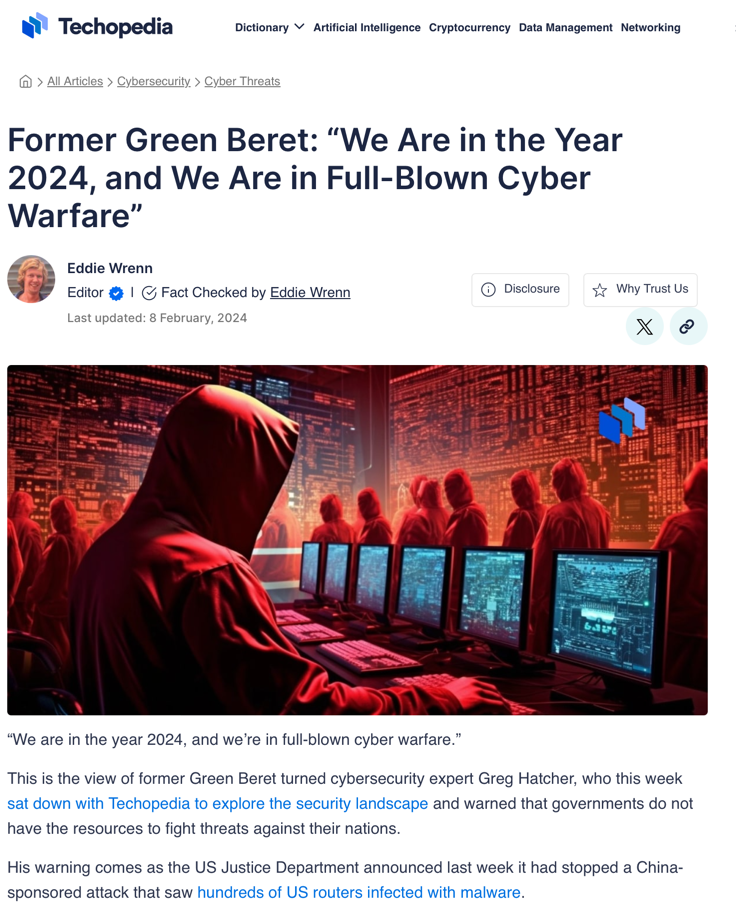
This next post is a must-read for those keen to understand the volatile landscape of cyber warfare. We delve into an illuminating conversation with Greg Hatcher, former Green Beret turned cybersecurity expert and CEO of White Knight Labs (WKL). His stern warning sets the tone for the reality we face today: “We are in the year 2024, and we’re in full-blown cyber warfare.” In this Techopedia interview, Hatcher provides his expert insights into the intensifying cyber threats that are not only targeting nations but infiltrating vital infrastructural sectors. His candid alerts underpin White Knight Labs’ commitment to mitigating such attacks on every level. Drawing from his experiences as a trainer at the National Security Agency (NSA) and his leadership at WKL, Hatcher presents an unparalleled perspective on international cyber conflict, pinpointing China, Russia, and North Korea as major threat actors. Join us as we engage with Hatcher’s in-depth discussion on the challenges in cybersecurity, the urgent call for government-private sector collaboration, and the insights he’s gained from his unique journey from Green Beret to a vanguard in the cyber warfare spectrum.
China’s Volt Typhoon Found Lurking in Critical Infrastructure for Years
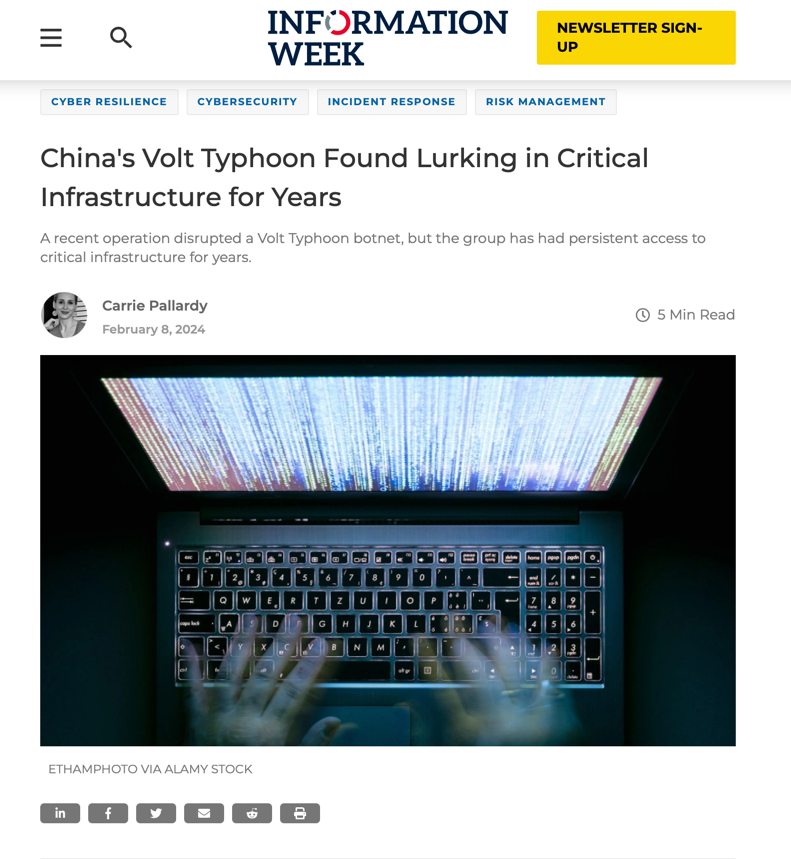
In a landscape where cyber warfare is no longer a shadowy prospect but a glaring battlefront, White Knight Labs stands as a bastion of defense, providing expert insights and robust security solutions. When recent revelations about China’s Volt Typhoon unearthed a sobering truth about the persistent vulnerabilities in critical infrastructure, WKL immediately recognized the profound implications for national security and corporate safety. As Greg Hatcher, the CEO of White Knight Labs, attests, “The presence of Volt Typhoon within critical infrastructure sectors underlines a dire need for heightened cybersecurity vigilance. WKL has long held that water treatment facilities, power plants, and nuclear entities—essentially the backbone of our society—represent prime targets for adversarial state actors.” The disconcerting situation has brought to light that, for half a decade, these keystones of everyday life have been compromised, possibly affecting the continental U.S., its various territories, and allies globally. The insidious nature of these attacks is a clarion call for a collective tightening of security measures. WKL stands ready to dissect this recent cyberstrategy exposure, bringing a wealth of knowledge and acumen to an anxious public. Hatcher, with a reputation for straightforward counsel and preemptive action, underscores the urgency of the response. “This is an example of a clear and present cyber threat that requires immediate and decisive action from both public and private sectors,” he adds. Through this introduction into the murky waters of cyber espionage, White Knight Labs endeavors not only to inform but to fortify and respond with actionable intelligence. Let us explore the complexities of the KV Botnet takedown, the persistence of Volt Typhoon, and the indispensable measures organizations must employ against such indomitable threats.
Straight Talk on Cybersecurity with Greg Hatcher
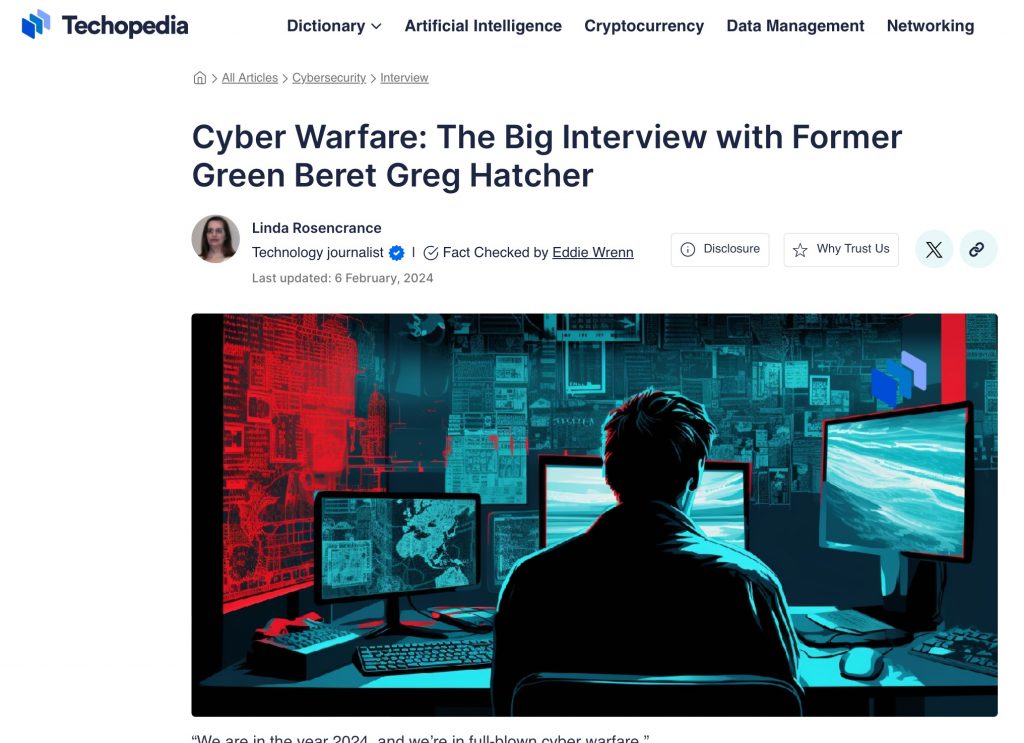
Cybersecurity is on everyone’s mind, but few understand it like White Knight Labs
Cybersecurity for Remote Work – Securing Virtual Environments and Endpoints
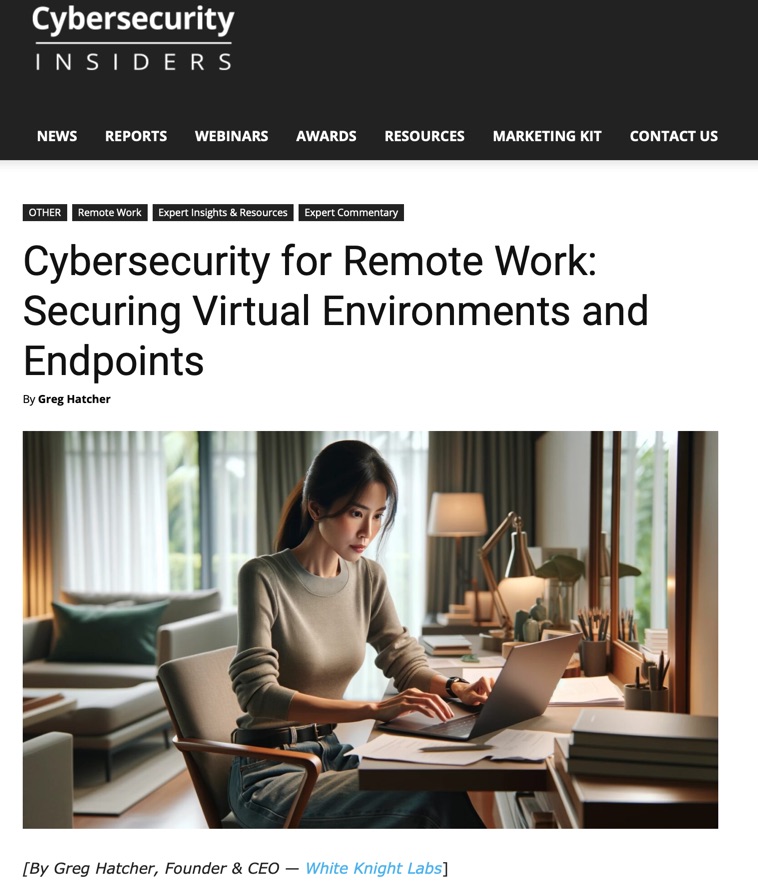
In this article, Greg Hatcher, the CEO of White Knight Labs (WKL), delves into the cyber security challenges brought about by the steady rise of remote work. Necessitated by the COVID-19 pandemic but sustained by its unique benefits, remote work is projected to include 22% of the American workforce by 2025. However, transitioning out of traditional office settings into virtual environments introduces numerous cyber threats due to broader and less secured network endpoints. Through this engaging piece, Hatcher unravels the various cybersecurity challenges linked with a remote setup, including threats caused by weak passwords, ransomware, file sharing, unsecured Wi-Fi networks, and personal device usage. He proposes several measures to ensure endpoint security for remote workers, such as strong password use, secured home networking, antivirus and internet security software, robust email security, and robust identity management and authentication protocols. As cybersecurity becomes ever more critical with remote work, understanding and implementing these safeguards are not just preferences, but necessities. Hatcher’s detailed insights into this area are valuable for any organization conscious of its data security in today’s rapidly digitalizing business landscape.
The Evolution of Cyber Threats: Unveiling A New Era
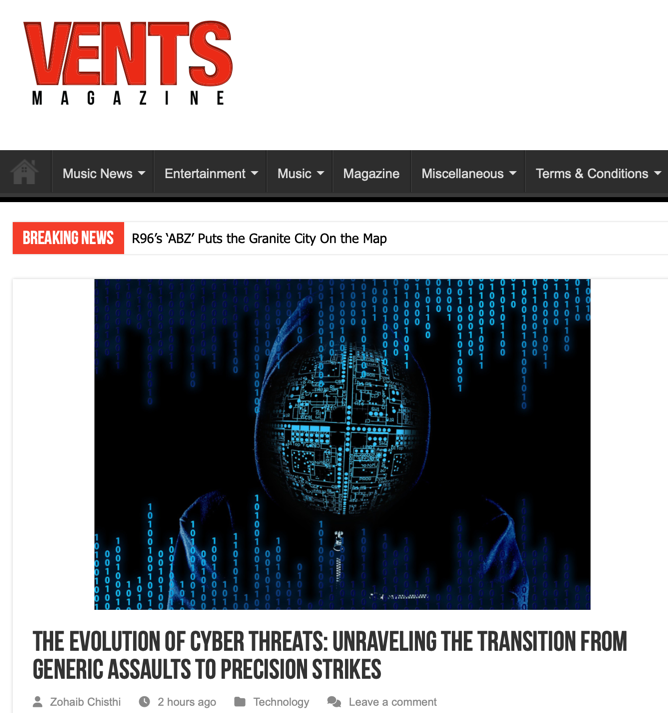
Beware! The landscape of cyber threats has undergone a massive shift that’ll redefine our stance on cybersecurity. A pivotal Vents Magazine article exploring this radical shift, titled “The Evolution of Cyber Threats: Unraveling the Transition from Generic Assaults to Precision Strikes”, calls for our attention. Authored by Greg Hatcher, CEO of White Knight Labs, the piece picks apart the transition from indiscriminate, broad-spectrum cyberattacks to increasingly precise, highly targeted online strikes—a shift as daunting as it is intriguing. In his detailed exposition, Hatcher reveals how technological advances have not only benefited the realms of productivity, communication, and entertainment, but seemingly have their dark side too. Intriguingly, the very technologies we’ve celebrated are being weaponized by malicious actors, crafting more sophisticated means to infiltrate systems and networks. Greg Hatcher’s insights into this transformative era of cybersecurity present a stark warning—it’s time we adapt our defenses to counter these complex, precision threat strikes. A hallmark of this technological evolution, the paradigm shift challenges our conventional understanding of cyber threats. Hatcher’s article becomes even more relevant in the current era when safeguarding digital assets is as important as protecting physical ones. With the spotlight on the shift from mass assaults to precision strikes, the exposition evokes a sense of urgency—it’s not just our systems that need to evolve, but our mindsets too. Stay ahead in this riveting cybersecurity journey, and brace yourself for these advanced online threats by reading the full article here. The comprehensive insights offered by Greg Hatcher in his contribution don’t merely illustrate the evolution, but arm you with knowledge in the frontline of the cyber threats landscape.
Claims that NSO’s Pegasus spyware helps Israel find hostages are ‘nonsense,’ experts say
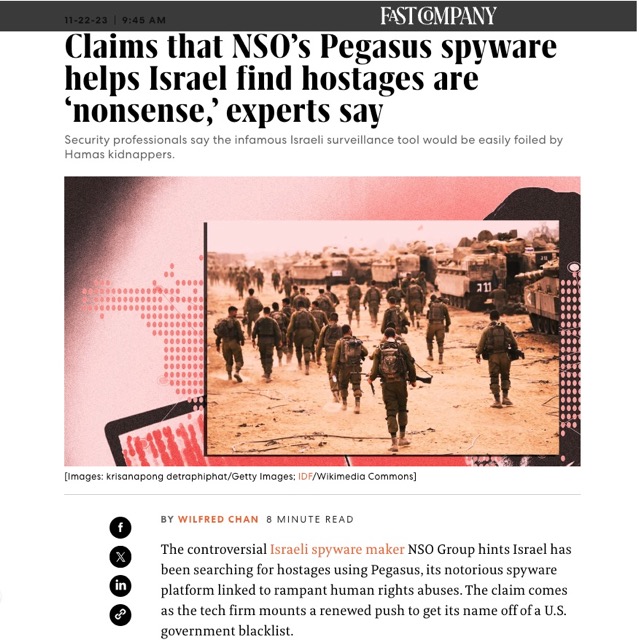
White Knight Labs operates in the upper echelons of cyber-security consulting, distinguishing itself through a focus on proactive, offensive cyber engagements. Their team of specialists works diligently on a variety of areas — from network and web apps to mobile apps, social engineering, and cloud penetration testing. Their approach hinges on the future itself – anticipating and countering potential digital threats to help their clients maintain a secure business environment. Recently, an article written by Wilfred Chan and published in Fast Company included a commentary from White Knight Labs’ CEO, Greg Hatcher. He lent his expertise to a discussion about NSO Pegasus spyware, an issue of growing importance in the digital realm, originating from the Israel-based NSO Group. Do note that Hatcher’s perspective on this topic, informed by his considerable industry experience, challenges some claims being made.
Co-Founder on NTD
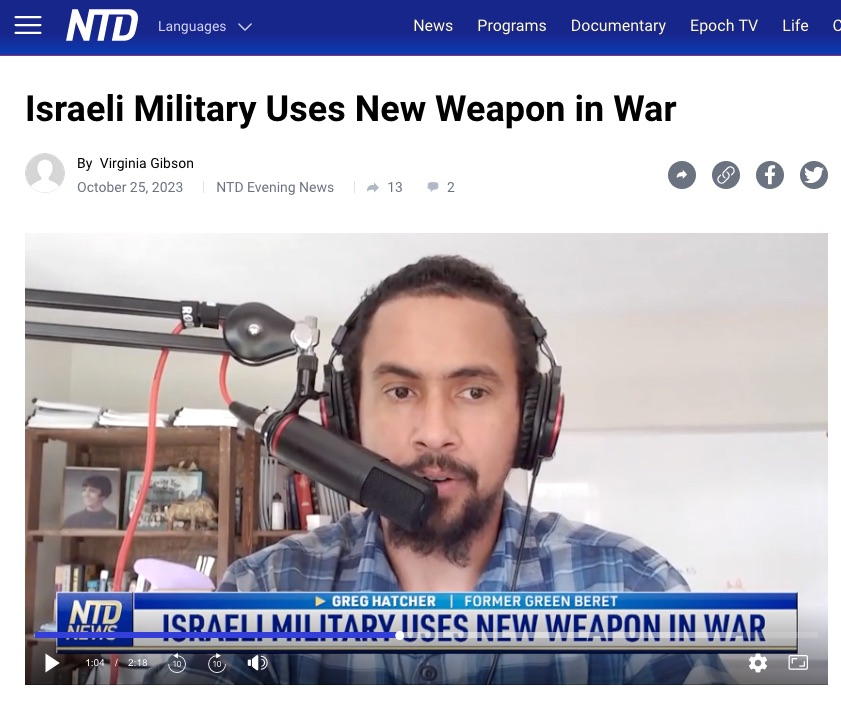
NTD’s Virginia Gibson talks with Greg Hatcher, a former Green Beret.
Essential Cyber Security Practices
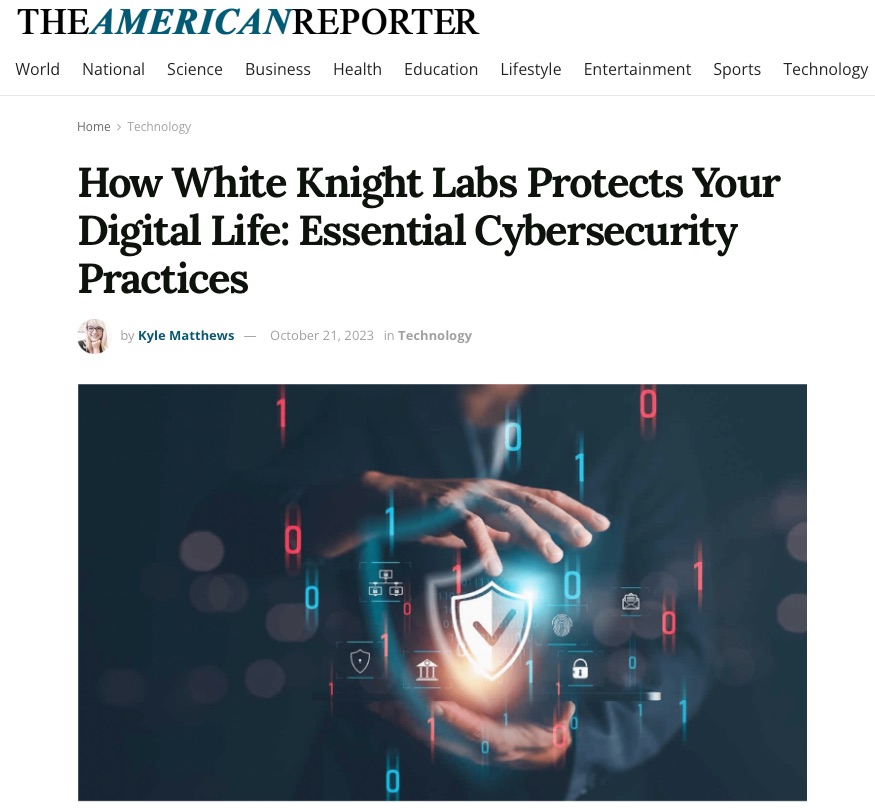
An article by Kyle Mathews on The American Reporter investigates the needs and methods of protecting your digital life. In an increasingly connected world, cyber security has become an essential concern, with individuals and companies facing numerous, often invisible threats. White Knight Labs, co-founded by former Army Special Ops soldier and NSA instructor Greg Hatcher, is at the forefront of this digital battle, equipping businesses with robust solutions and essential cybersecurity practices. In this article, we delve into the views of Hatcher, who strongly believes that the human element is central to effective security in this digital age, and explore how White Knight Labs is safeguarding our digital lives.
Hamas-Aligned Cyber Group
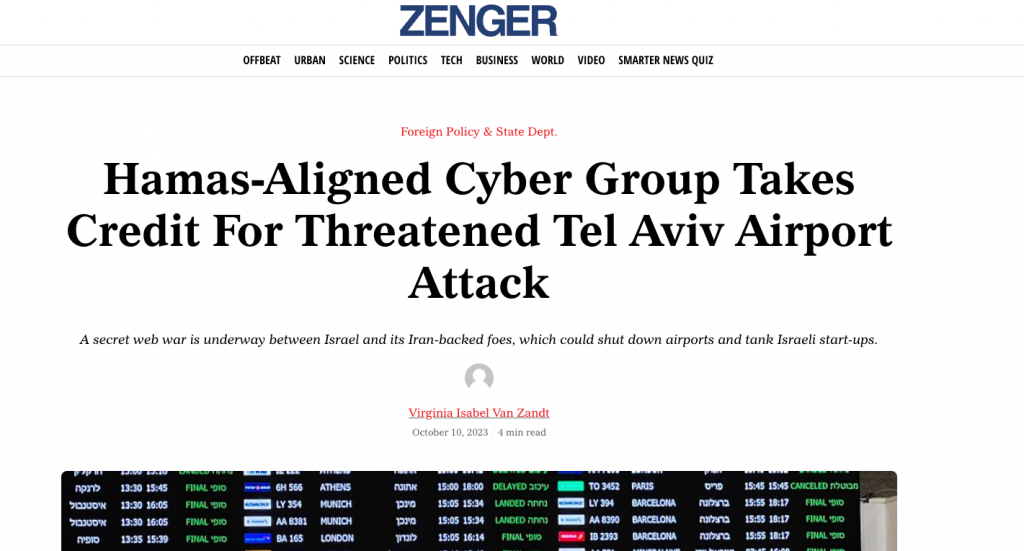
In a posting on Zenger by Virginia Isabel Van Zandt takes a look at Hamas aligned Cyber Group. Greg Hatcher, CEO of White Knight Labs is quoted in the article noting the importance of balance in relying on SIGINT and HUMINT. In the constantly evolving landscape of cyber warfare, a new development has emerged that warrants attention. A cyber group associated with Hamas, known as the Stucx Team, has taken responsibility for a cyber attack threat against Tel Aviv airport. This dramatic escalation in the cyber offensive has led to a surge in cyber incidents that are intrinsically tied to the geopolitical tension in the region. The intertwining of cyber warfare with physical conflict serves as a stark reminder of our rapidly changing world where digital fortification can be as important as physical defenses. Greg Hatcher, the CEO and Co-founder of White Knight Labs who brings years of cybersecurity expertise to analyze these increasingly complex threats in the full article. Stay tuned to our news page for his insights, as we unpack the implications of this emerging threat.